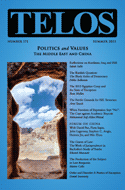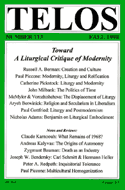 The Kurdish Question is a continuation of violence, protest, and repression that persist from the unfinished national state-building of the early twentieth-century Europe. This article compares it with similar but more successful ones in the Nordic countries. The Kurdish Question depends on the democratization of Turkish society. There are black holes on both sides of the conflict that absorb efforts to build democratic institutions. Enlightenment critique of absolutism in Europe established the supremacy of the social over the political order. The republic represents the will of the people. Koselleck argued that this idea potentially drifts towards totalitarianism and brutalities: those who do not obey are excluded to the point of losing their human worth. This is the heart of the Kurdish Question in Turkey today. In democracy different groups defend their interests in political movements that attempt to rule by law. In the Kurdish Question negotiable interests have been identified and reforms are on the way. The problem is that symbolic black holes absorb efforts to negotiate into the requirement of unity and consequent inability to deal with difference. On the Turkish side, the unity is imposed by the secular and modern nationalism itself. On the Kurdish side it consists of a silence about differences in the Kurd society, which is still largely tribal but with a large population outside the clan system.
The Kurdish Question is a continuation of violence, protest, and repression that persist from the unfinished national state-building of the early twentieth-century Europe. This article compares it with similar but more successful ones in the Nordic countries. The Kurdish Question depends on the democratization of Turkish society. There are black holes on both sides of the conflict that absorb efforts to build democratic institutions. Enlightenment critique of absolutism in Europe established the supremacy of the social over the political order. The republic represents the will of the people. Koselleck argued that this idea potentially drifts towards totalitarianism and brutalities: those who do not obey are excluded to the point of losing their human worth. This is the heart of the Kurdish Question in Turkey today. In democracy different groups defend their interests in political movements that attempt to rule by law. In the Kurdish Question negotiable interests have been identified and reforms are on the way. The problem is that symbolic black holes absorb efforts to negotiate into the requirement of unity and consequent inability to deal with difference. On the Turkish side, the unity is imposed by the secular and modern nationalism itself. On the Kurdish side it consists of a silence about differences in the Kurd society, which is still largely tribal but with a large population outside the clan system.
|
The following paper was presented at the 2015 Telos Conference, held on February 13–15, 2015, in New York City. For additional details about the conference, please visit the Telos-Paul Piccone Institute website. In my short essay, I would like to outline a new strategy of the universalization of history, which emerges from the analysis of modern Jewish practice of philosophizing. I call it a Marrano strategy, by building an analogy between the religious practices of the late-medieval Sephardic Jewry, which was forced to convert to Christianity but kept Judaism “undercover,” and the philosophical intervention of modern Jewish thinkers who spoke the seemingly universal idiom of Western philosophy but, at the same time, impregnated it “secretly” with motives deriving from their “particular” background.[1] Yet, they did not do it in order to abolish the universalist perspective, but to transform it; for the last heirs of this “Marrano” line, Walter Benjamin and Jacques Derrida, the proper universalism amounts to an after-Babel project of mending the broken whole from within, horizontally, without assuming the lofty position of a general meta-language, but through the effort of multi-linguality. Telos 171 (Summer 2015) is now available for purchase in our store. Writing at the Times of Israel, Jeffrey Herf explains why Matthias Küntzel’s Germany and Iran: From the Aryan Axis to the Nuclear Threshold should be on your must-read list this summer. You can purchase a copy in our online store. Save 20% through the end of June by using the coupon code TELOS1968. |
||||
|
Privacy Policy · Data Protection Copyright © 2026 Telos Press Publishing · All Rights Reserved |
||||
 Catherine Pickstock’s “Liturgy and Modernity,” from Telos 113 (Fall 1998), is an effort to find an alternative to liberal individualism and social fragmentation in modernity. Pickstock finds this alternative in liturgy: a liturgical critique of modernity where “liturgy” functions as a thoroughly political category. Liturgy is specially equipped to confront modernity due to its nature as ritual behavior (and therefore universal among humans). Yet the liturgical is to be favored over “ritual” for two reasons. First, ritual has already been relegated to its own “delimited sphere” in modernity, where it is viewed as a private superstructural category. Furthermore, ritual in the modern mind is regarded merely as “mechanical repetitions divorced from any informing narrative.” Liturgy, on the other hand, responds to the former challenge by its nature as “a pattern of social action” (not a delimited sphere) and responds to the latter by its foundation in a “privileged transcendent signifier.”
Catherine Pickstock’s “Liturgy and Modernity,” from Telos 113 (Fall 1998), is an effort to find an alternative to liberal individualism and social fragmentation in modernity. Pickstock finds this alternative in liturgy: a liturgical critique of modernity where “liturgy” functions as a thoroughly political category. Liturgy is specially equipped to confront modernity due to its nature as ritual behavior (and therefore universal among humans). Yet the liturgical is to be favored over “ritual” for two reasons. First, ritual has already been relegated to its own “delimited sphere” in modernity, where it is viewed as a private superstructural category. Furthermore, ritual in the modern mind is regarded merely as “mechanical repetitions divorced from any informing narrative.” Liturgy, on the other hand, responds to the former challenge by its nature as “a pattern of social action” (not a delimited sphere) and responds to the latter by its foundation in a “privileged transcendent signifier.” 

